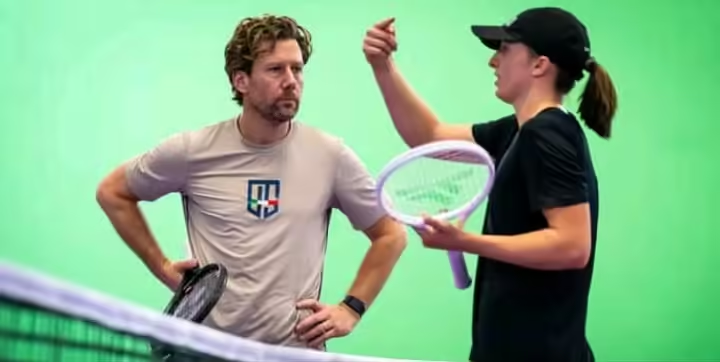Wim Fissette, now working as Iga Świątek’s coach, has offered insights into their initial weeks together, giving a glimpse into his approach and her response. With a history of coaching elite players like Naomi Osaka, Kim Clijsters, and Victoria Azarenka, Fissette brings extensive experience to his new partnership with Świątek. His primary goal is to build on her strong foundation, focusing on optimizing her game while respecting her strengths and style.
Fissette started with a detailed observation phase, assessing Świątek’s game, personality, and mindset. He emphasizes the importance of understanding each player as an individual, tailoring his approach to suit their unique qualities. For Świątek, he noted her remarkable mental resilience and technical skills, especially her footwork and precision. Recognizing her analytical nature, Fissette has focused on creating an environment that encourages open dialogue and collaborative decision-making. This mutual respect and understanding allow him to suggest adjustments without disrupting her rhythm.
One area of particular focus has been Świątek’s strategic play. Fissette has been working with her on diversifying her tactics, helping her to become more unpredictable on the court. This includes fine-tuning her serve and enhancing her adaptability to different playing conditions. Fissette believes that these refinements will make her an even more formidable opponent, especially against top-ranked players with whom she has faced challenges.
Another important element of their initial phase was establishing trust and building a comfortable dynamic. Fissette sees the player-coach relationship as a partnership, where trust and communication are paramount. He acknowledged that Świątek has an intense work ethic and sets high standards for herself. By supporting her in managing expectations and balancing her commitment with mental well-being, he aims to ensure that her journey remains fulfilling and sustainable.
In terms of off-court interactions, Fissette has taken a hands-on approach to understanding Świątek’s life outside of tennis, noting that her personal interests and passions are integral to her overall balance. His coaching philosophy includes helping players cultivate resilience and perspective, factors he sees as key to maintaining long-term success.
The early results of this partnership are promising. Fissette’s influence has begun to show in Świątek’s recent performances, where her evolving style has been noticeable. Her composure on the court, combined with a more varied game, suggests that she is embracing the adjustments positively. For Fissette, the first few weeks are a critical period to establish foundations that will support gradual but consistent improvement.
As they move forward, Fissette remains focused on helping Świątek achieve her potential, not just in terms of titles but in developing a game that aligns with her personal goals and vision. His experience and empathetic approach seem to be well-suited to Świątek’s personality, promising a productive collaboration that could elevate her to new heights in her career. Both share a commitment to continuous learning and improvement, a mindset that aligns well with Świątek’s ambitions to solidify her position at the top of women’s tennis.
